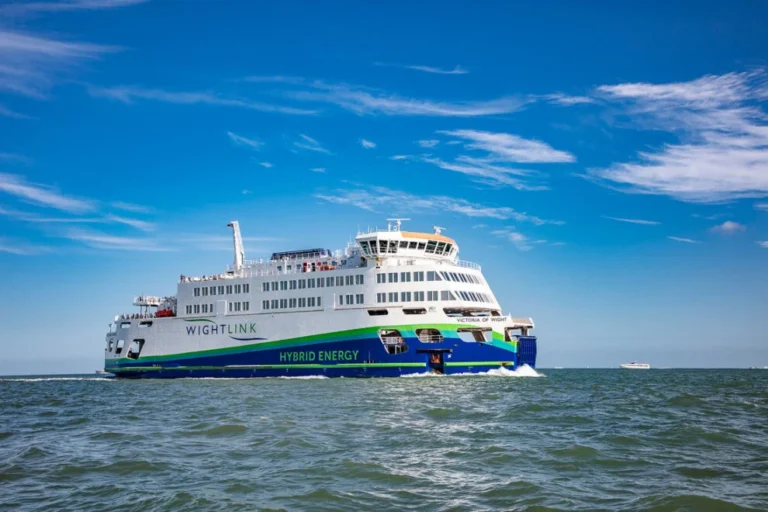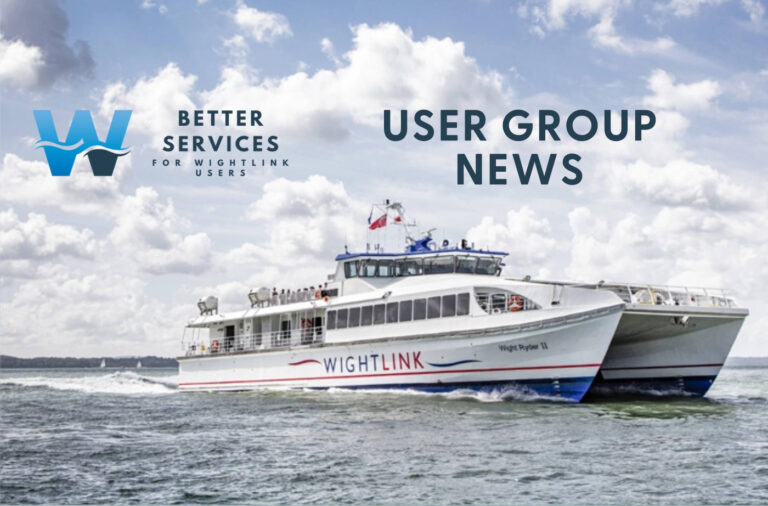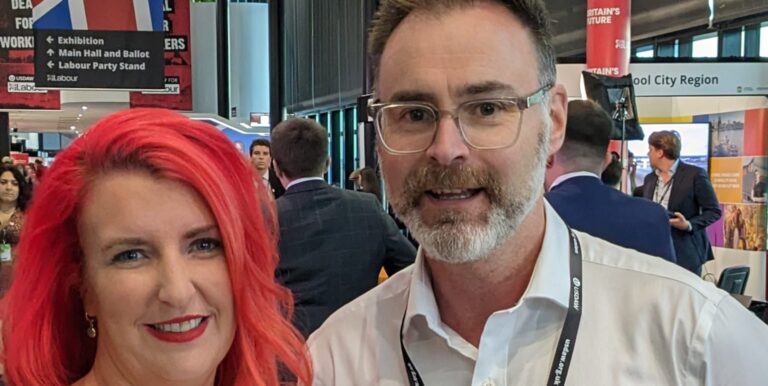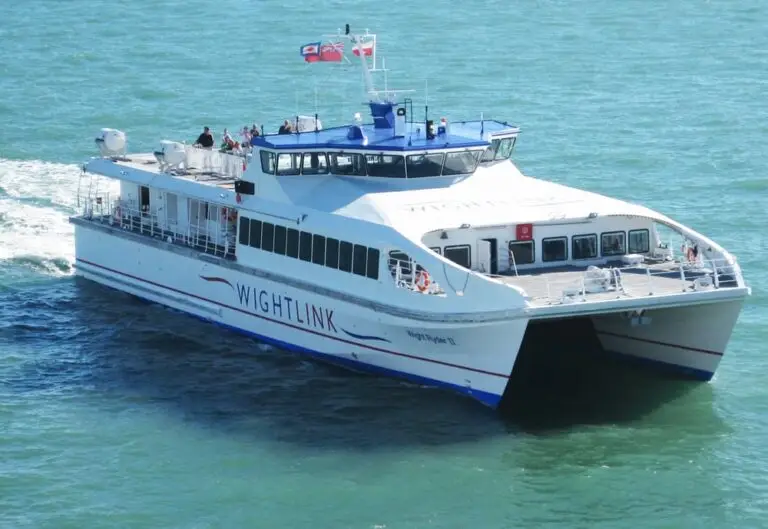Anger at “abysmal” and “extortionate” Isle of Wight ferries in UK
Nearly 13,000 people have signed a petition demanding urgent action to improve the reliability and affordability of the ferry services between the Isle of Wight and the English mainland. Residents report considering leaving because of rising transport costs that restrict access to medical care and personal visits.
The petition accuses the ferry companies of using passengers as “cash cows.” Travel on and off the island, the organiser Simon Jackson writes, “is absolutely extortionate and simply cannot be afforded by many people now.”
The Isle of Wight is the largest and second-most populous island in England. Situated off the south coast, it has a population of around 140,000. Tourism accounts for 30 percent of the local economy. Access is chiefly by ferry, operated by two private companies.
Wightlink runs two vehicle ferry routes, from Lymington to Yarmouth and from Portsmouth to Fishbourne. It also operates a foot passenger catamaran service between Portsmouth and Ryde, which links up with the island’s limited train service. (Island Line is part of the South Western Railway private franchise). Red Funnel runs vehicle and passenger ferries between Southampton and Cowes.
![Wightlink foot passenger catamaran Wight Ryder II leaving Portsmouth, 2009 [Photo: Editor5807 - Own work]](https://www.wug.org.uk/wp-content/uploads/2024/08/554c865cc9780d11ddf6f20dcf3606d0008c4db0-1024x768.jpg)
There is also a foot passenger hovercraft service from Southsea to Ryde, operated by Hovertravel. There have been several attempts to establish new small-scale private ferry operators out of Yarmouth.
Dissatisfaction with transport provision and its cost came to a head when services were drastically reduced as the COVID pandemic hit. Initially cut altogether, the passenger ferry was not covered by central government’s £6.5 million grant across the three companies to cover “lifeline” supplies and services.
When finally restored, the passenger ferry operated a severely curtailed timetable with the last foot passenger ferry to the mainland at 8.20pm. This encouraged retired headteacher Bronwyn Hamilton-Brown to set up the Wightlink Users Group (WUG) on Facebook 18 months ago, which now has more than 8,000 members. The Daily Mail cited the comments of a 71-year old resident who, having lived on the island for five years, was planning to leave as “You are completely cut off from society by this stupid stretch of water.”
The distance to the island from Lymington, Portsmouth, and Southampton is just four miles, six miles and 10 miles respectively.
WUG identifies its concerns as affordability, especially in scrapping fares for islanders requiring National Health Service (NHS) treatment on the mainland, and timetable improvements to allow later travel, better train connections and shorter delays between crossings.
Rising prices are a major concern. Both companies use dynamic pricing, making many crossings during peak tourist periods unaffordable.
Wightlink offers residents multilink passes offering lower prices, but these must be purchased in advance in one payment. Wightlink say their vehicle prices for residents start at £27.75 per sailing for a standard car, but this only applies if you spend £1,665 on a book of 60 single fares.
These passes cannot be used on every crossing, and only a limited number are allowed even when they can be used. Outside that limited applicability and availability, islanders report having had to pay up to a staggering £440 for a vehicle return during the summer.
The petition says ticket prices are damaging local business and tourism. While much of the evidence remains anecdotal, this seems to be borne out by July’s welfare benefit claims figures.
The Office for National Statistics (ONS) reported 3,135 people on the island claiming “out of work benefits” in July, up by 190 on June when the tourist season was already underway. The figure is also up 600 on the equivalent period last year. The ONS figures misleadingly also include claimants of Universal Credit. This is not an out-of-work benefit, indicating that seasonal wages are not covering needs.
The crisis points to other infrastructural problems. The island’s population is older than the national average. A 2021 demography data report showed a greater proportion of population aged 50 years and over and a lower proportion of those aged 20-44 years than the average across England.
Young people (aged 0-19) accounted for 19.1 percent of the island’s population, compared to 23.6 percent across England. The 20-44-year-olds formed 23.6 percent of the population, against 32.3 percent nationally. Most strikingly, 21.4 percent of the population were aged 70 years and over, against a national average of 13.6 percent.
This inward migration of a relatively affluent group of older people disguises wider levels of rural and coastal poverty and deprivation and points to raised requirements for health provision which cannot be met locally. There is just one hospital, with few specialist departments. Patients must routinely travel to Portsmouth or Southampton for treatment and investigation.
The Isle of Wight is one of the “dental deserts” created by decades of underfunding and austerity. It is all but impossible to get NHS dental care on the island, and even the private dentists that have—for a price—provided some coverage are scaling back their work.
This makes the necessity of affordable travel even more apparent. Wightlink has a 50 percent discount for foot passengers and a £35-each-way cap on vehicle fares for those travelling to NHS hospital appointments. But this offer “does not apply to appointments with GPs, dentists, pharmacists or opticians.”
Even that £70 vehicle cap, won by WUG campaigning, is hardly satisfactory. WUG highlighted the case of Chris Tunnell, whose end-stage kidney disease requires urgent monthly dialysis in Portsmouth. Tunnell’s partner, Paula Brizelden, told press that they “get the [foot passenger] Catamaran and buses because we can’t afford to take the car.”
When Tunnell suffered sepsis and a stroke, his hospital trip was delayed because there was no ferry space available for the ambulance. Jackson’s petition denounces the ferries’ reliability as “abysmal.”
Wightlink claims their reliability remains high: 99.9 percent in June and 99.3 percent in July, with punctuality of 93.7 and 94 percent respectively. Wightlink claimed 29 cancellations across all routes, 26 due to mechanical breakdowns and three to staff shortage. During the period July 12-31, however, WUG members identified 40 cancellations on the Portsmouth-Fishbourne route alone.
Rather than logging cancellations, the company is issuing an “amended timetable” without the missing sailings so it can continue to claim high reliability. Last weekend, the company was forced to announce a “last resort” timetable because of staff shortages.
The escalation of mechanical problems and staff shortages at both companies points to their existence as financial assets dedicated to turning a profit, rather than service providers. Wightlink was originally Sealink, the ferry service of nationalised British Rail, sold off in 1984 for £66 million as part of the Thatcher government’s privatisation drive.
A £100 million management buy-in of Wightlink in 1995 was followed by a secondary management buy-out in 2001, worth £180 million.
In 2005, Macquarie European Infrastructure Fund bought the company. The Australian banking company’s aggressive profiteering from privatised public assets has had a devastating effect on infrastructure, as Thames Water demonstrates.
Macquarie sold Wightlink in 2015 to Balfour Beatty Infrastructure Partners (BBIP), which became Basalt Infrastructure Partners a year later. Basalt sold a 50 percent stake in Wightlink to Canadian investment company Fiera in 2019.
Always a private company, Red Funnel has also long been traded by financial corporations. Having bought Red Funnel in 1989 to forestall a hostile takeover, Associated British Ports Holdings sold it in 2001 to JP Morgan Partners. The Bank of Scotland backed a £60 million management buyout in 2004, and the new owners (including HBOS, Bank of Scotland’s holding company) sold it three years later to the Prudential’s Infracapital. In 2017, a consortium including the West Midlands Pension Fund bought the company.
Both companies have seen strike votes by their workers in recent years. In 2022, Red Funnel workers walked out several times in a pay dispute. In 2020, Wightlink workers voted for strike action against attacks on pension and roster agreements.
Until this year, the island returned one MP. The incumbent, Conservative Bob Seely, defended private provision of essential services while trying to sound concerned. His proposal was minor voluntary regulation of the ferry services and “more transparent ownership.”
Recent boundary changes created two small constituencies from this year. Seely stood for the new West Wight constituency and was so locally unpopular that the vote against him returned Richard Quigley as the Island’s first Labour MP. Tory Joe Robertson was elected for East Wight.
Robertson is pushing for government regulation as a means of protecting “competition” (i.e. private enterprise), saying, “People will need to put political differences aside and work together” to this end. Quigley—part of a Starmer government boasting it will be the most “pro-business” in history—has shown he is prepared to get on board, saying the ferries are “too big to let party politics get in the way.” Quigley said his concern was the effect the problems are having on business and the government’s “industrial strategy.”
The escalating crisis over cross-Solent travel stems from the profit system both parties defend. The issue is not how to game an existing pricing system structured for the benefit of financial corporations but providing an integrated transport and social care system for the benefit of all.
This article is reproduced with persmission from WSWS.ORG






